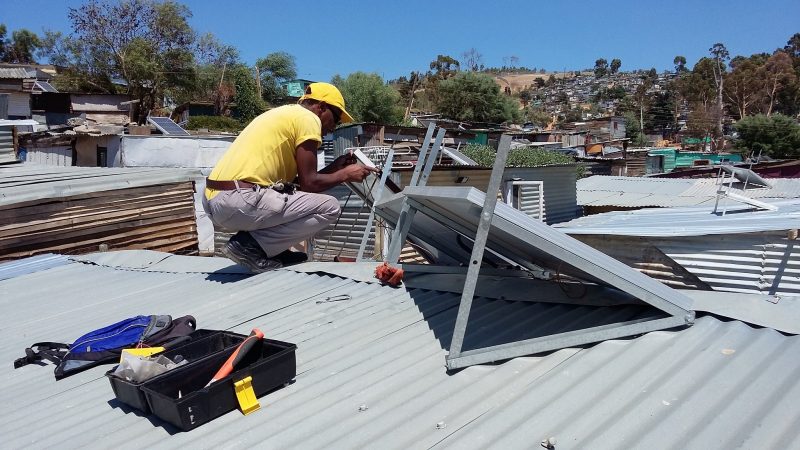Green economy news round-up, Feb 2021
All the latest news & views from across the green economy sector, in a handy monthly digest

If you've got a story on the green economy that you think we need to know about - get in touch.
We’ve had highs and lows in the last couple of months. The US welcomed Joe Biden, who has rapidly put climate back on the agenda for the country (and the world), and nature was finally put at the centre of economics in the landmark Dasgupta Report. Yet we have also seen the pandemic widen already gross global inequality and the vaccine rollout is set to increase that gap further.
Countries are starting their COVID-19 recovery plans, but is the green recovery going in the right direction, and fast enough?
Green Recovery
We breathed a big sigh of relief as the US said goodbye to Donald Trump (just). And Biden has been pressing ahead with an ambitious wave of new US climate action - including rejoining the Paris climate agreement accord hours after becoming president, protecting a third of US land and waters and launching a $2tn clean energy plan which aims to create millions of new jobs.
The EU has pledged 750 billion euros for a green deal, with 25% set aside specifically for climate action (is this enough we wonder?). Germany has emphasised green recovery measures in its annual economic report. Pakistan is focusing on protecting nature and creating green jobs. Scotland has announced £1.9 billion investment into tackling climate change and creating green jobs, while Cyprus is used as an illustration of how climate-friendly recovery policies can increase job numbers. Ethiopia, France and New Zealand are amongst the countries that have included restoration commitments as part of covid recovery plans.
“ Could COVID recovery plans create millions of new green jobs, shaping a new labour market and ensure a just and inclusive transition? There’s a thought.”
The green recovery is starting to gain traction, but is global progress going fast enough? Just 12% of covid stimulus will benefit climate and nature according to a new paper. And stimulus funds are still funnelled into fossil fuel production and consumption. There is now a ‘need for speed’ on climate policy for us to have any chance of meeting net zero targets. New research suggests that without greener recovery plans the 1.5C climate target temperature reduction could be out of reach. Energy economist and head of the International Energy Agency Fatih Birol has warned that our coal use must decrease for a true green recovery, spotlighting China and India as the key regions still heavily dependent on the black stuff.
A helpful new brief is out analysing the different green recovery tracking tools available. And watch this space - our own Green Economy Tracker will soon be updated with COVID-19 recovery policy details.
Valuing Nature
The biggest story came from the release of the Economics of Biodiversity Review, a landmark report written by economist Sir Partha Dasgupta. The research - commissioned and published by the UK Treasury - argues that we need to overhaul our economic system if we are to survive, so that governments, businesses and investors see the value of protecting nature for the irreplaceable services it provides - such as pollination, clean water, and a stable climate - instead of destroying it for short-term economic gain.
Reaction to the Dasgupta Report has been broadly positive. Some of our favourite pieces include this opinion piece from UNEP head Inger Anderson, some key takeaways in case you don’t want to read the full 600 pages, how much an elephant is really worth and why we must go further and begin restoring nature and not just limit destruction. It’s not all been plain sailing though, with prominent figures such as George Monbiot and Kate Raworth critiquing the report.
In other news about nature, deforestation in Southeast Asia has been dramatically reduced and especially so in Indonesia. Yay!
Reducing Inequality
It’s abundantly clear that the pandemic has widened inequality across the world. Billionaires and already rich countries have become richer. In contrast, women, BAME groups, informal workers and/or those from poorer backgrounds have been most affected. UK charity Oxfam calls covid the ‘inequality virus’. And with the vaccine rollout, this looks to worsen further.
But slithers of hope are found: young campaigners are fighting back against ‘the tyranny of the now’ - and are beginning to win. The first-ever UK citizens climate jury has called on governments to tax big polluters and protect green spaces. And could COVID recovery plans create millions of new green jobs, shaping a new labour market and ensure a just and inclusive transition? There’s a thought.
Greening Economic Sectors
In the race to clean energy, Vietnam has increased its capacity for solar by 25-fold (and here’s a heartening story about how solar has helped small-scale farmers recover in Vietnam too). Denmark is even building an artificial island to house it’s wind energy, and Estonia has a new female prime minister who has pledged to neutralise carbon emissions by 2050 and stop oil shale power production.

But not all countries are swapping where their energy is coming from. Mexico is still backing coal and the UK has only just dropped plans for Europe’s largest gas plant after climate protests. Southeast Asia’s clean energy sectors have also faced mixed fortunes post covid, mainly from a drop in investment.
We are seeing more stories about businesses pledging to become greener. General Motors have announced that they will only make electric cars by 2035 and will be carbon neutral by 2040. And those arch climate baddies, plane manufacturers, will reportedly be able to fly on 100% sustainable fuel by 2030.
And here’s an interesting and stat-rich piece on what happens to the shift in power as we move from fossil fuels to renewable energy.
Reforming Financial Systems
The IMF announced this month that it is placing climate change at the centre of its work. Climate change will also be key to the European Bank’s policy review. Green bond issuance is rising post pandemic and is set to rise in 2021 (though the market in China appears to have stalled, raising concerns). Investor pressure is beginning to make its mark on polluters. Asset manager BlackRock has called for full CO2 disclosure from companies.
The European Investment Bank has joined forces with Housing Bank to support SMEs in Jordan. US climate campaigners are calling on Joe Biden to commit to the country’s pledge of delivering £8bn to the Green Climate Fund, a fund created to support poorer countries adapt to the impacts of climate change and lower their own emissions. And we’d love to see more of funds like this black-owned fund targeting the racial wealth gap or Chilean-first sustainable bond financing women-only SMEs.
Measuring and Governing
Jordan and the United Nations have launched a programme to develop investment into the SDG targets. SDGs will be financed at a national level and will focus on climate change and gender equality.
If you’ve got green economy news you want to tell us about, drop us a line! (We’re particularly keen to hear from different business sectors and SMEs.)
- Kate Lewis, GEC


